小学英语PEP人教版六年级下册《B_Let's_learn》ppt课件4
pep人教版六年级下册英语Unit1 B Let's Learn PPT课件

Unit 1 How tall are you?
Period 4
教 学 目
1. 能听说读写下列形容词的比较 级形式:heavier, longer, thinner,bigger和smaller. 2. 能够灵活准确的运用以上 形容词比较级描述人物和动 物的特征差异。
3. 能够完成Let’s play 部分 的活动并在活动中用相应的 语言正确表达。
heavy
The dog is heavy
heavier elepant is heavier. Heavy,heavier,the
The elepaThe tiger is thin.
The dog is thinner.
Thin, thinner, the dog is thinner.
标
4. 能够理解Story time中的故事。
Let’s Chant
Who is taller? Who is shorter? Who is older? Who is younger? And who is stronger? Mike is taller. Amy is shorter. Lee is older. Sue is younger. And John is stronger.
Do you know what they are? Can you find out the differences?
Find out the differences between the father and the son.
Let’s Play
和你的好朋友比较一下你们的身高、 体重、四肢、头发和五官。
Story Time
longer The bus is long. The train is longer
pep人教版六年级下册英语Unit4 My holiday B Let's Learn课件

went ice-skating
Zoom went to a zoo.
What did he see? elephants rowed a boat He saw _________and____________.
Before Zoom went home. What did he do? bought presents He _______________for his friends. presents What did Zoom buy? He bought________.
rowed rowed / rowed )a boat on 2. She ________( the West Lake.
see see / saw ) elephants at 3. Did you ______( the zoo?
went ( go / went) skiing on the 4. They_______ holiday last winter.
What, what, what did you do? Went, went, I went skiing. What, what, what did you do? Went, went, I went ice-skating. What ,what, what did you do? Saw, saw, I saw elephants. What, what, what did you do? Rowed, rowed, I rowed a boat. What ,what, what did you do? Bought, bought, I bought presents.
Unit 4 My Holiday
B Let’s learn
英语人教版六年级下册Unit 4 Let's Learn 说课稿

今天我说课的内容是PEP小学英语六年级下册Unit4 Then and now (Part B Let’s learn & Listen , match and say).我将从教材分析、教学方法、教学过程等方面展开说课。
一、教材分析这节课是以讨论学习个人的过去与现在的变化而展开的教学活动。
学生通过这节课的学习能够使用过去时描述自己的过去,以及运用一般现在时突出现在的变化,下面我分析一下本课的教学目标和教学重难点 :教学目标:1.知识目标:能够听、说、读、写3个运用于个人能力或爱好的短语:go cycling , ice-skate, play badminton.2.能力目标:能够运用所学词汇以及句型表达对事物喜好的变化及原因。
3.情感目标:培养学生积极运用英语表达的态度,在日常生活中养成良好的生活及学习习惯,争取是自己变得越来越好。
二、教学方法语言是一种交际工具,小学阶段的语言教学侧重于口语。
为了帮助学生掌握和运用这些单词和句子,我注重引导学生采用听说、朗读、讨论、操练等方法,培养学生敢于开口,积极实践的良好学习习惯。
在这一课中,我做到的课前准备有:PPT、录音、Flash动画等三、教学过程Step1: Warm-up(热身导入)这一环节通过与学生一起唱歌曲“Changes in me”引入课题。
Step2: Presentation(新课呈现)这一环节分为两个部分。
在Let’s learn中,首先通过展示图片引出词汇及对话,教学过程中通过课件提示学习单词和句型,然后让学生听录音跟读Let’s learn中单词和句子,最后让学生根据Let’s learn图片提示进行问答,模仿对话练习,巩固所学句型。
Step3: Practice(趣味练习)这一环节主要是趣味练习。
利用课件让学生准确、快速地说出单词并采用开火车的活动方式完成单词认读活动,巩固四会单词。
Step4: Summary(课堂小结)师生一起总结本节课学习的词汇和句型,说说本节课的重难点,教师评价学生的表现。
人教版英语六年级下册 Unit 1 B Let’s learn(课件)
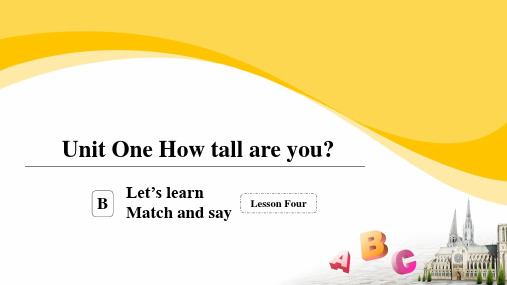
Wu Binbin’s fish: _____
Mike’s fish: _____
Sarah’s fish: _____
Oliver’s fish: _____
Chen Jie’s fish: _____
Mike’s fish is _______ than _______.
写出下列单词的比较级
Test
Look, listen and learn
II. Presentation
Look, listen and learn
II. Presentation
Look, listen and learn
II. Presentation
bigger
(big 的比较级)
更大的
smaller
(small 的比较级)
更小的
Look, listen and learn
II. Presentation
9kg
18kg
heavy
heavyier
(heavy 的比较级)
更重的
Look and learn
II. Presentation
thin heavy
big small strong
thinner heavier bigger smaller stronger
… + be 动词 + 形容词的比较级 + than + …
Goodbye!
Listen, follow and practice
John: How heavy are you, Jim?
你多重,吉姆?
Jim: I’m 52 kilograms.
我52公斤。
小学英语PEP人教版四年级下册《B_Let's_learn》说课稿4

小学英语PEP人教版四年级下册《B_Let’s_learn》说课稿4一. 教材分析《PEP人教版小学英语四年级下册》是根据我国教育部颁布的《小学英语课程标准》编写的一套小学英语教材。
本册教材的主题涵盖了生活中的各种场景,通过学习使学生能够掌握基本的日常用语,提高他们的语言运用能力。
二. 学情分析四年级的学生已经掌握了一些基本的英语词汇和句型,具备一定的听、说、读、写能力。
但学生在语言运用方面还存在一定的困难,如发音不准确、词汇量不足、语法知识掌握不牢固等。
因此,在教学过程中,需要注重学生的语言实践,提高他们的语言运用能力。
三. 说教学目标1.知识目标:学生能够掌握本课的生词和句型,正确运用所学知识进行日常交流。
2.能力目标:通过听说读写等多种教学活动,提高学生的英语语言运用能力。
3.情感目标:激发学生学习英语的兴趣,培养他们积极向上的学习态度。
四. 说教学重难点1.重点:学生能够熟练掌握并运用本课的生词和句型进行日常交流。
2.难点:学生能够准确地发音,并在实际情境中运用所学知识。
五. 说教学方法与手段1.采用情境教学法,通过设置真实的生活场景,让学生在实际语境中学习和运用英语。
2.运用任务型教学法,让学生在完成任务的过程中,提高他们的语言运用能力。
3.利用多媒体教学手段,如课件、视频等,增加课堂的趣味性,激发学生的学习兴趣。
六. 说教学过程1.热身(5分钟):通过播放英语歌曲,让学生活跃气氛,调动他们的学习积极性。
2.Presentation(10分钟):教师通过展示图片、实物等,引入本课的主题,引导学生学习生词和句型。
3.Practice(10分钟):学生进行小组活动,运用所学知识进行交流,教师巡回指导。
4.Production(10分钟):学生根据自己的兴趣,创作一个小对话或故事,运用所学知识。
5.总结(5分钟):教师对本课内容进行总结,强调重点知识。
七. 说板书设计板书设计要清晰、简洁,能够突出本课的重点知识。
PEP人教版六年级英语下册Unit4-Then-and-now-B.-Let’s-learn课件 (2)
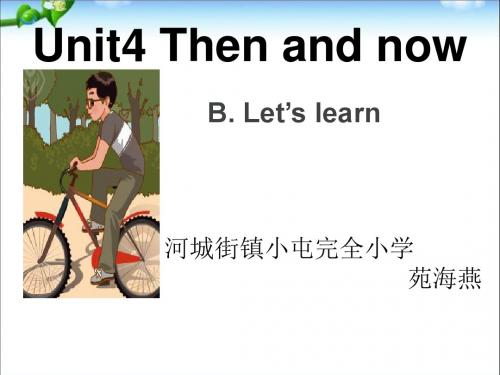
ice-skate = go skating
I could ice-skate
I couldn‘t ice-skate
play
badminton
I could play badminton
say and mach
(说一说,连一连)
go cycling
ice-skate
play badminton
Unit4 Then and now
B. Let’s learn
河城街镇小屯完全小学 苑海燕
Whicn season do you like best ?why
warm
spring
summer
hot
go swimming
go on a picnic fly a kite
go fishing
eat ice cream
Pair work (合作练习)
autumn windy
autumn Yifan: I didn't like before. 我以前不喜欢秋天。 windy I thought it was , 我认为它有风, and I couldn't . 并且我不能打羽毛球。 play badminton
Thank you
Mike:
Yifan: Now so
4
5 6
?
. 现在我喜爱骑自行车, . 所以我喜欢夏天.
Homework
1 我以前不喜欢... I didn't like ... before 2 我认为它太... I thought it was ... 并且我不能... and I couldn't.. How about now ? 3 现在呢? 4 现在我喜爱... Now I love to ... 因此我喜欢... so I like ...
小学英语人教版六年级下册《B let's learn》课件

had a cold
saw a film
slept
read a book
lucky baby
唱反调
教师说出词组原形,学生说出它的过去式。如:教师说see a film,学生说saw a film.
Game
1
2
4
5
请翻译感冒
read a book读出来并做一个动作
提问你的同位What did you do?
slept.
/e/
I
last Monday
sleep
上周一
动词过去式的特别情势
read
read
have
had
see
saw
sleep
slept
记住!
20
21
22
23
24
25
26
27
28
1
2
3
4
5
一MON.
二TUE.
三WEN.
四THUR.
五FRI.
六SAT.
日XXX.
一MON.
二TUE.
三WEN.
四THUR.
谢谢
saw a film.请做一个看电影的动作
3
A: What did you do__________? B:I _______ .A: Did you __________?B: Yes, I did./No, I didn’t.
Make a dialogue!
What did ____ do _____?
saw a film
/ɔ:/
I
the day before yesterday
see
/i:/
人教版PEP小学英语六年级下册第四单元Part B Let's learn习题课件
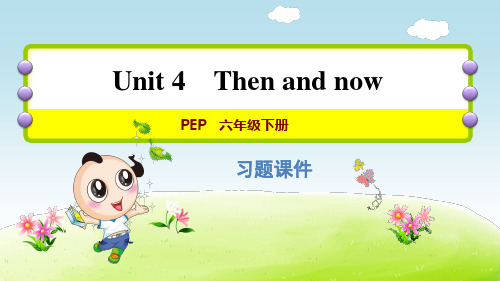
My parents love sports, but they couldn't play badminton two years ago. In these two years, they go to the gym to play badminton every week. Now, they play it very well.
A. takes pictures
B. skates
C. goes cycling
A. playground B. gym C. park
( C ) 3. Peter was ______ before. Now he is ______.
A. thin; strong
B. quiet; active
C. short; tall
( C ) 4. Peter often ________ to the countryside.
Peter is my little brother. Before, he was short, so he couldn't go cycling. Now he is tall, and he often goes cycling to the countryside.
Two years ago, I didn't like winter. I thought it was too cold. But now I love to ice-skate, so I like winter.
三、根据图片,将句子补充完整。
1.
Before: ×
Now: √ Before, Li Mei couldn't __p_la_y__ ___t_h_e___ ___er_h_u___. Now, she ___ca_n____.
PEP人教版英语六年级下册Unit4 B let's learn教学设计

本单元出自人教版六年级下册Unit4B Then and Now,主要谈论事物和人物的今昔变化,在单元整合时以Changes为主题。
本课是第五课时,通过文本重构为读写课,从第四课时主要以第一人称表达自己的变化过渡到第五课时主要以第三人称描述他人的变化,通过以Mike在毕业欢送会上分享他最好的朋友Wu Yifan在小学阶段的变化情境,引导学生阅读和解构文本,并结合自身的实际情况,撰写自己最好朋友的变化,并在毕业欢送会上分享,表达对朋友的珍惜与美好的祝福。
3.课件上应该把问题层次呈现出来,发散思维的开放性问题不够多;
4.最后的分享猜出好朋友之后可以上台拥抱,活跃气氛;
5.Enjoy a video如果把歌词呈现出来让学生跟唱会更好。
(Appearances and characters, Hobbies, Abilities)
2)What other changes can you think of?
3)What do you think of these changes?
通过通读、精读文章后,引导学生归纳总结Wu Yifan在外貌和性格、爱好以及能力方面的变化,并引导学生思考还可以从哪些方面来谈论他人的变化,引导学生正确地看待这些变化。
Talk about Mike’s changes.
通过Song复习旧知,并活跃课堂气氛和,激发学生上课的激情。
Step 2: Pre-reading
1.Free talk:
Talk about students’changes
通过Free talk的内容引起学生对自己变化的思考,并以毕业欢送会为主线进入Changes of my best friend文本。
英语核心素养
PEP小学英语六年级下册Unit4Part B Let's learn

PEP小学英语六年级下册Unit4 Part B Let’s learn教学设计一、教学目标与要求1、能够听说读写动词词组:bought presents, rowed a boat, saw elephant, went skiing, went ice-skating。
2、能听说认读句型:What did you do on your holiday? I bought prensents.3、培养学生对假期生活的兴趣,并提高学生外出旅游的安全意识。
二.教学重点难点1.重点:能够听说读写五个动词词组的一般过去式形式。
2.难点:掌握四会单词bought, rowed和saw的读音和拼写。
三、课前准备1、教师准备教学课件和点读机。
3、给学生准备练习题及调查表。
四、教学过程(一)warm-up1. Greeting:T: When is Labour Day? Labour Day will be coming. S: May 1st.T: Where are you going on Labour Day? S:I’m going to…….. How are you going there? S:I’m going there by…What are you going to do on Labour Day? S:I’m going to…….. Where did you go on last Labour Day? S:……How did you go there? S:I went there by,,,,, What did you do on last Labour Day? S:……..2.Let’s chant(1) Page 41 listen ,clap and say together.(2) 自编Let’s chant 展示(三组)(二)Presentation and practice1.T:We had a lot of fun on our holiday. Because we have many interesting things to do during the holiday. Did you have a good holiday last summer? T: Sarah and Amy had a good holiday last summer. But where did they go? Let’s go and have a look .2.ppt Where did Sarah go? Where did Amy go?Ppt How did Sarah go there? How did Amy go there?Ppt What did Sarah do on her holiday? What did Amy do on her holiday?(Ppt出示新授短语)3.pptHarbin(1) 板书短语原型及动词过去式(2) 带读教记,轮读大小声升降调造句拍手说rowed rowed rowed a boat唱反调(3) 抄写(学一个抄一个,边抄,边拼,边记)(4) P pt 总结本节动词过去式的变化4.Listen to the tape and follow5.Read “Let’s learn” in pairs.6.Game :Can I sit?7.自编chant 练习表格中的全部内容On my holiday I went skiing.Where did you go? What did you do?On my holiday I went ice-skating.How did you go? What did you buy?On my holiday I bought presents.What did you do? How did you go?On my holiday I went by planeWhere did you go? What did you do?On my holiday I rowed a boat.What did you do? What did you see?On my holiday I saw elephants.I was so happy on my holiday.(三)Consolidation1.Show the passageIt was a long holiday. Amy went to Yunnan Lijiang by plane. She rowed a boat and saw elephants in a park. She climbed Yulong snow mountain and took pictures. She sang and danced with her friends and bought presents for her parents. Sarah went to Harbin by plane. She went skiing and went ice-skating with her parents. She made a snow man and played with snow. She went to the Holy Sophia church at last. She took many beautiful pictures in Harbin. We had a lot of fun on our holiday.2.Writing:要求:运用所学的动词短语,用一般过去时态写写你的暑假生活《My holiday》。
小学英语PEP人教版六年级下册《B_Let's_learn》课件

I listen to music.
watched TV
Zhang Peng
listened to music
played sports
washed clothes
cleaned my room
‹日期/时间›
‹页脚›
Listen and write the names.
played football
‹页脚›
‹日期/时间›
read a book
‹页脚›
‹日期/时间›
went fishing
‹页脚›
‹日期/时间›
went hiking
‹nt to a park.
go (went) swimming
read (read ) a book go (went) fishing
Unit Three Last weekend
•
Part B Let’s talk
‹日期/时间›
高寨‹页子脚› 镇中心小学 彭建雯
‹日期/时间›
‹页脚›
‹日期/时间›
‹页脚›
I played football. What did you do last weekend?
I played football and cleaned the room. What did
‹日期/时间›
‹页脚›
Zip: How was your weekend? Zoom: It was a busy one.
Zip: What did you do Saturday morning?
Zoom: I washed my clothes. I went to a park.
Zip: What did you do Saturday afternoon?
新PEP小学英语六年级下册Unit4-Then-and-now-B-Let's-learn课件

thought
is
was
can
could
自读对话,并试着理解
Wu Yifan: I didn’t like winter before. I thought it’s too cold, and I couldn’t go cycling.
Mike: How about now? Wu Yifan: Now I love to ice-skate, so I like winter.
ice-cream
ice-water
Before , I didn’t like ice. Now , I like ice-cream and ice-water.
Let's learn
play badminton
↙
↘
bad doctor
Before , I couldn’t play sports . Now I love to play badminton .
Game(游戏):
Listen to the music and pass the box. 要求:
音乐停止时,手持盒子的同学从盒子中抽 出一张纸,如果抽出的纸条写着lucky, 将会获得小礼物一份如果抽出的纸条是写 有“read it ”,则根据自己写的答案, 大声的读出来。
Before, I _______. Now, I _______.
Can you read①?Learn in groups!
小组读一读。 •不会读怎么办?
a. 请小老师教一教 b. 大家一起猜猜怎么读,什么意思 c. 举手问老师
city clean
↖↗
go cycling
↘
why
ate
人教PEP版英语六年级下册Unit 4 Part B教学课件(附教案与反思)

Robin gave him some water.
ran like a cheetah could win tripped and fell woke up
原形 had could was gave
felt woke
过去式 have can
is give feel wake
原形 were thought said
active (形容词)积极的;活跃的
【反义词】 quiet安静的
He is active. 他很活跃。
change (动词)改变
The school changes a lot now. 学校变化了很多。
【拓展】 change作名词, 意思“变化”。
视频
点击“Let's try”,跟 我一起练吧!
She often plays badminton. 她经常打羽毛球。
cycling 骑自行车运动(或活动)
【短语】 go cycling 去骑自行车
They often go cycling. 他们经常参加骑自行车运动。
Game
I say you do
Listen and answer the questions
连词成句。
1. different, we, now, all, are (!) We are all different now!
2. am, active, now, very, I (.) I am very active now.
Sum-up
重点词汇
different 不同的
active积极 的;活跃的
人教版(三年级起点)六年级下册
Part B Let's learn Listen, match and say
六年级下册英语(人教版PEP)Unit 2 Last weekend Part B Let's learn 课件
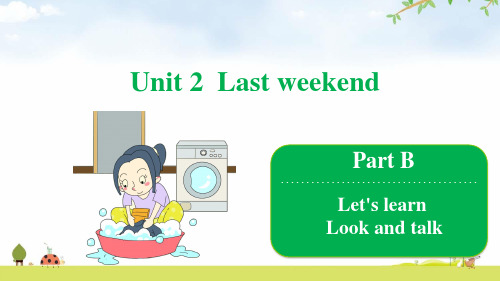
课后作业
课后作业
1.熟记本课时所学单词。 2. Exercise: 完成练习题。
He slept.
had a cold
Mike
went boating
Chen Jie read a book
Amy Sarah
saw a film washed her clothes
小组活动
三人一组,A描述自己昨天做的事情,B、C就A昨天的活动 进行问答。
Unit 2 Last weekend
Part B
…………………………………
Let's learn Look and talk
单元新词
had
患病;得病
I had a fever last Saturday. 我上周六发烧了。 had a cold 感冒
单元新词
slept
睡觉
I slept well last night. 我昨晚睡得很好。 had asleep睡觉
had a cold
saw a film slept
John:What did you do last weekend ? Amy: I saw a film. John: Did you like it ? Amy: Yes, I did. It was great.
知识讲解
表示过去的时间状语
一般过去时常和表示过去的时间状语连用。常见的表示过去的时间状语有:
示例
小组活动
I played basketball yesterday.
Did he cleaned the room?
What did A do yesterday?
B
A
He played basketball.
人教(PEP)六年级英语下册Unit 4 Then and now (课件)

One day, I’m going to visit the moon.
(将来)某一天,总有一天 Past? Now?
Future? (将来)
One day, I’m going to
…
plan
Can you make sentences? 你会造句吗?
One day, I’m going to…
One day, I’m going to
…
plan
The Americans took about five days to get there in to1o9k6:9. take的过去式 V.花费 about 大约,大概
get there 到达那里
• 1969年7月21日,美国的“阿波罗11号” 宇宙飞船载着三名宇航员成功登上月球, 美国宇航员尼尔·阿姆斯特朗在踏上月球表 面这一历史时刻时,曾道出了一句被后人 奉为经典的话——这只是我一个人的一小 步,但却是整个人类的一大步。
go cycling ice-skate
play badminton think
你能说出下面短语的过去式吗?
go cycling
went cycling
play badminton
played badminton
think
thought
is
was
can
could
summer winter
autumn spring
dining hall
餐厅,食堂
What can we do in the dining hall ? have lunch
单词竞赛(3分钟速
library 记) grass
cinema
PEP英语六年级下册unit 2 Last weekend B Let's learn教学课件
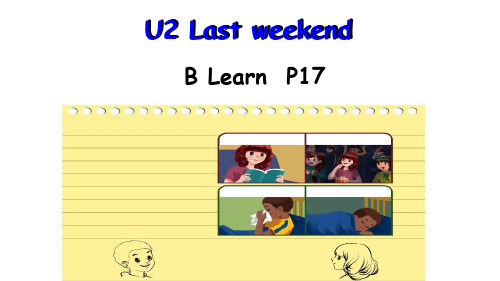
How was the film? It was __g_r_e_at____.
Read after it
John: What did you do last weekend? Amy: I saw a film. John: Did you like it? Amy: Yes, I did. It was great.
cook→cooked wash→washed
C 末尾有e加d
am/is→wasE see→saw have→had
sleep→slept
不规则go→went do→did
drreiankd→→dreraandk
D 末尾变y为i加ed
love→loved
study→studied
like→liked
It was _g_o_od_/_/_ni_ce_/_/_ha_p_p_y.___
What did he do last weekend?
He __pl_a_y_e_d_f_o_o_tb_a_l_l .
Amy
t did Amy do
Worth reading (值得一读)
last weekend?
stayed at hom and read book
last night
Mar.4th
一 二 三 四 五 六 日 一二 三
the day before yesterday yesterday
today
What did he do yesterday?
He________________.
What did he do the day before yesterday?
John
21:00 Sun.
- 1、下载文档前请自行甄别文档内容的完整性,平台不提供额外的编辑、内容补充、找答案等附加服务。
- 2、"仅部分预览"的文档,不可在线预览部分如存在完整性等问题,可反馈申请退款(可完整预览的文档不适用该条件!)。
- 3、如文档侵犯您的权益,请联系客服反馈,我们会尽快为您处理(人工客服工作时间:9:00-18:30)。
(2)(2) I did my homework (3)(3) I went ice- skating
presents for my friends (4)(4) bought I
‹日期/时间› ‹页脚›
‹日期/时间›
‹页脚›
rowed a boat
went skiing
‹日期/时间›
‹页脚›
What did you do on your holiday? went ice-skating
‹日期/时间›
‹页脚›
What did you do on your holiday?
saw elephants
‹日期/时间›
‹页脚›
‹日期/时间› ‹页脚›
-Where did you go on your holiday? -I went to Hong Kong.
-What did you do there? -I ate good food.
‹日期/时间› ‹页脚›
-Where did you go on your holiday?
Beijing. -I went to……
-What did you do there? visited my grandparents. -I ……
‹日期/时间› ‹页脚›
Amy: Sarah: Amy:
Where did you go on your holiday? I went to Harbin. How did you go there? I went by train. What did you do?
Sarah:
Amy: Sarah:
‹日期/时间›
I went skiing.
‹页脚›
学生分成4大组,每组分别写地点,时间, 交通工具,动词短语的过去式形式. 请一生分别从4组中抽取1张,用动作 表演纸条上的内容,其他学生根据表演猜测纸条上的内容.表演 的学生一边做动作一边提问: Where did you go on your holiday? 其他学生猜: I went to …… 如果有人回答正确,表演的同学就依次提问: How did you go there? What did you do there ?其他学生继续猜.
‹日期/时间› ‹页脚›
教学重点: 1.重点词汇: 假日活动相关词汇的动词过去式形式. 2.语言结构: What did you do on your holiday? ---I rowed a boat. Where did you go on your holiday? ---I went to Xinjiang. how did you go there? ---I went by train. 3.语言功能: 询问别人曾经去过的地方与 曾经参加过的活动.能用英文书信 形式与人交流. 教学难点: 单词过去式的教与学,多种语言 ‹日期/时间› ‹页脚› 结构的综合运用.
‹日期/时间›
‹页脚›
What did you do on your holiday?
I……
ate good food sang and danced
learned Chinese
took pictures ‹日期/时间›
climbed a mountain
‹页脚›
What did you do on your holiday?
What did you do on your holiday?
presents
bought presents
‹日期/时间› ‹页脚›
What did she/he do on holiday?
cleaned the room
watched TV climbed a mountain
sang and ‹日期 /时间› danced
‹日期/时间›
‹页脚›
‹日期/时间›
‹页脚›
It was a long holiday. We left Beijing on February 1st and g Harbinon the 2nd . On the first day, I went to a park with my parents On the 3rd,I went skiing.On the 4th ,I did my homework. On the 5th, I went ice-skating.On the 6th , I bought presents for my friends. We got back to Beijing by plane on the 7th . For the last day of the holiday, we relaxed and prepared to go back to work or school. (1) I went skiing on the 3rd. on the 4th. on the 5th. on the 6th.
took pictures
‹页脚›
ate good food
Mike : Where did you go on your holiday? John : I went to Xinjiang. Mike : What did you do there?
John : I sang and danced with my new friends.
‹日期/时间›
‹页脚›
‹日期/间›
‹页脚›
Warm -up
‹日期/时间›
‹页脚›
教学内容: 1.话题: My holiday 2.相关语言: Where/ How did you go on y What did you do on your holida 3.新学词汇: learned Chinese, sang and da ate good food, took pictures, climbed a mountain, bought pre rowed a boat, went skiing, saw elephants, went ice-skatin
